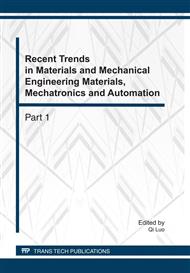[1]
Liang-Kung Chen: The health challenges of aging society, Taipei Veterans General Hospital Magazine, Vol. 144 (2009), pp.2-8.
Google Scholar
[2]
Dowliing A.F. JR. : Do hospital staff interfere with computer system implementation?, HealthCare Management Review, Vol. 5 (1980), pp.23-32.
Google Scholar
[3]
Janine A. Overcash, Jason Beckstead, Martine Extermann and Sara cob: The abbreviated comprehensive geriatric assessment (aCGA): a retrospective analysis, Critical Reviews in Oncology/Hematology, Vol. 54, no. 2 (2005), pp.129-136.
DOI: 10.1016/j.critrevonc.2004.12.002
Google Scholar
[4]
Edward MF Leung: Team approach and comprehensive geriatric assessment, Geriatrics and Gerontology International, Vol. 4 (2004), pp.41-44.
Google Scholar
[5]
Gray L, Moore K, Smith R, Dorevitch M.: Supply of inpatient geriatric medical services in Australia, Internal Medical Journal , Vol. 37(2007), p.270–273.
DOI: 10.1111/j.1445-5994.2007.01317.x
Google Scholar
[6]
Stuck AE, Siu AL, Wieland GD, Adams J, Rubenstein LZ. : Comprehensive geriatric assessment: A meta-analysis of controlled trials, Lancet, Vol. 342 (1993), p.1032–1036.
DOI: 10.1016/0140-6736(93)92884-v
Google Scholar
[7]
Gray L. : Geriatric consultation: Is there a future ? , Age and Ageing, Vol. 36 (2007), p.1–2.
Google Scholar
[8]
Huub A.A.M. Maas et al.: Comprehensive Geriatric assessment and its clinical impact in oncology, European Journal of Cancer, Vol. 43 (2007), pp.2161-2169.
Google Scholar
[9]
David Solomon: National institutes of health consensus development conference statement: geriatric assessment methods for clinical decision-making, Journal of the American Geriatrics Society, Vol. 36 (1988), pp.342-347.
DOI: 10.1111/j.1532-5415.1988.tb02362.x
Google Scholar
[10]
Delen Dursun : Analysis of cancer data: a data mining approach, Expert Systems, Vol. 26, no. 1 (2009), pp.100-112.
DOI: 10.1111/j.1468-0394.2008.00480.x
Google Scholar
[11]
Nai-Wen Kuo and Yao-Yu Chung: Construction of Comprehensive Geriatric Assessment Information System – A Case Study of Medical Center in Taiwan, 2010 INFORMS Service Science Conference, Taipei, Taiwan, July 7-10 (2010), pp.255-261.
Google Scholar
[12]
Nai-Wen Kuo : A System Planning for Healthcare Services, 2010 International Colloquium on Computing, Communication, Control, and Management (CCCM 2010), Yangzhou , China, August 20- 22 (2010), pp.442-446.
Google Scholar
[13]
Sherman, F. T. : Functional assessment: easy-to-use screening tools speed initial office work-up, Geriatrics, Vol. 56, no. 8 (2001), pp.36-40.
Google Scholar


